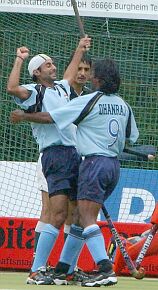
Prabhjyot and Dhanraj Celebrate an Indian Goal
 he
24th GEW Champions Trophy hockey tournament
was held at the 6000-seater Rot-Weiss (Red-White) stadium in Cologne, Germany, from August
31 to September 8.
The countries taking part were Australia, Germany, India, Netherlands,
Pakistan and South Korea. It was the first time that 3 Asian teams were
taking part in the Champions Trophy.
he
24th GEW Champions Trophy hockey tournament
was held at the 6000-seater Rot-Weiss (Red-White) stadium in Cologne, Germany, from August
31 to September 8.
The countries taking part were Australia, Germany, India, Netherlands,
Pakistan and South Korea. It was the first time that 3 Asian teams were
taking part in the Champions Trophy.
With 14 of the squad of 16 aged 22 or younger, the young Indian team
did well to finish 4th in the 6-nation tournament. India had the following match
results:
| Date |
Result |
Goal
Scorers - India |
| Aug 31 |
India 3 - Netherlands
3 |
Jugraj Singh (22 m)
Dhanraj Pillai (39 m)
Prabhjyot Singh (67 m) |
| Sep 1 |
Germany 3 -
India 2 |
Gagan Ajeet Singh (37 m)
Jugraj Singh (63 m) |
| Sep 3 |
India 3 - Australia
2 |
Jugraj Singh (11 m)
Deepak Thakur (17 m)
Gagan Ajeet Singh (48 m) |
| Sep 4 |
India
3 - Pakistan 2 |
Prabhjyot Singh (21 m)
Jugraj Singh (33 m)
Gagan Ajeet Singh (52 m) |
| Sep 6 |
South
Korea 4 - India 2 |
Dhanraj
Pillai (40 m)
Gagan Ajeet Singh (68 m) |
| Sep 8 |
Pakistan
4 - India 3 |
Jugraj Singh (12 m)
Dileep Tirkey (48 m)
Gagan Ajeet Singh (52 m) |
The matches of the tournament were the two India-Pakistan matches, one
at the league stage (won by India), and the other to decide the 3rd/4th place (won by
Pakistan). Fans came from Holland, Belgium and France, apart from the host
country Germany, for the two Indo-Pak clashes. There was tight security,
as well as segregation of the Indian and Pakistani fans. In a sporting
gesture, the players applauded each other's national anthem, shook hands warmly and conducted a joint press
conference after the first league match.
Veteran Dhanraj Pillai was outstanding in the first match, and had a
hand in all of the 3 goals scored by India. The first goal resulted when
Dhanraj single-handedly dodged 4 Pakistani defenders before passing to Prabhjyot who
put in the finishing touches. The second, a penalty-corner converted by skipper
Dileep Tirkey, was the result of another piercing Pillai run. For the third goal, Dhanraj collected a
Dajeet Singh Dhillon cross, weaved past two Pakistani defenders, waited for Gagan Ajeet Singh to move into
position before releasing the ball. Gagan drew goalkeeper Ahmed Alam out
before tapping home from an acute angle.
The second Indo-Pak match was notable for Pakistan fighting back from
1-3 down with only 12 minutes left, to win 4-3 with a 3 goal burst in 5
minutes. Pakistan thus deservedly won the bronze medal. The only
disappointment for Pakistan was that star penalty corner specialist Sohail Abbas
could convert only 3 out of 21 penalty corners awarded to Pakistan in the tournament - a below average tally for the country's highest scorer in history.
Netherlands took the goal medal defeating Germany 3-2 on penalty strokes, after
70 minutes of scoreless regulation and 15 minutes of scoreless golden goal extra time.
This was the first ever goalless final in Champions Trophy history.
The final result in the favour of Netherlands can be viewed in the
context of these quotes by the opposing coaches: "In every training session we practice penalty strokes," said Dutch coach, Joost
Bellaart. "Since the end of the World Cup in March we have not had time to practice penalty strokes," said Germany's coach, Bernhard Peters.
When asked about India's performance in the Champions Trophy, Dhanraj
Pillai said, "How long can we come back and just say that we played well.
Our fans want results and a medal as a testimonial for our efforts. They are not happy with anything less than that, even if we
happen to beat the top teams."
India's Dhanraj Pillai was voted the player of the tournament, Germany’s Clemens Arnold was the best
goalkeeper, Jong ho Seo of Korea was most promising player and the top scorer,
with 7 goals, was Netherlands’ Taeke Taekema.
The final positions : 1- Netherlands, 2 - Germany, 3 - Pakistan, 4 -
India, 5 - Australia and 6 - South Korea. Argentina will replace Korea in the
next edition of the Champions Trophy, to be held in Amstelveen, Netherlands,
from August 16 - 24, 2003.
The Indian team comprised the following:
Goalkeepers: Devesh Chauhan (Indian Oil), Bharat Chetri (Karnataka)
Backs: Dileep Tirkey (Indian Airlines-Captain), Jugraj Singh, Kanwalpreet Singh (both Punjab), Dinesh Nayak
(Tamil Nadu)
Midfielders: Sukhbir Singh Gill (Bharat Petroleum), Viren Rasquinha
(Indian Oil), Vikram Pillai (Mumbai), Ignace Tirkey (Services), Bimal Lakra
(Indian Airlines)
Forwards: Dhanraj Pillai (Indian Airlines), Deepak Thakur,
Prabhjyot Singh (both Indian Oil), Daljeet Singh Dhillon, Gagan Ajeet Singh,
Tejbeer Singh (all Punjab), Arjun Halappa, Sandeep Michael (both Karnataka).
Officials: Rajinder Singh (Chief Coach), Narender Singh Sodhi (Assistant
Coach), Sampath Kumar (Physiotherapist), Dr. Rajkumar Jaipal (Doctor) and Aslam Sher Khan (Manager)
![]()